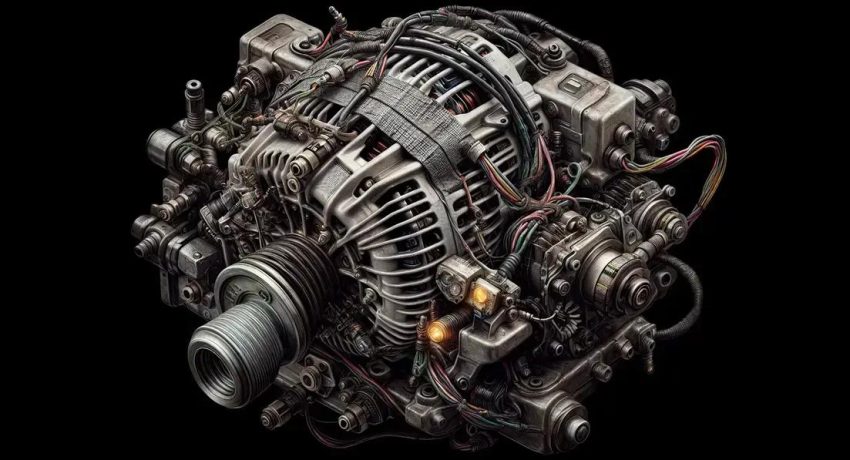Signs of a bad alternator include dimming lights, strange noises, electrical failures, battery warning lights, and frequent battery issues, indicating the need for immediate inspection or replacement.
Noticing the signs of a bad alternator can prevent unexpected car troubles. From dimming lights to strange noises, there are telltale signs that something is off. Are you aware of what to look for?
Table of Contents
ToggleCommon symptoms of a failing alternator

Recognizing the common symptoms of a failing alternator is essential for any car owner. An alternator is crucial for charging your vehicle’s battery and powering electrical components when the engine is running.
Dim Lights
If you notice that your headlights or dashboard lights are dimming while driving, it could indicate that your alternator is struggling to provide adequate power. This symptom is often a sign that the alternator is failing to charge the battery properly.
Strange Noises
Listen for unusual sounds coming from the engine. A failing alternator may produce a grinding or whining noise, which could be due to worn-out bearings or other internal issues. If you hear these noises, it’s important to have your alternator inspected.
Electrical Failures
If your car’s accessories, such as power windows or radio, are not functioning properly, it might be because of a faulty alternator. An alternator issues can lead to intermittent power problems that affect these components.
Battery Warning Light
Pay attention to your dashboard warning lights; if the battery warning light illuminates, it’s a clear sign that there’s an issue with your charging system. This light often indicates that the battery is not receiving proper charge from the alternator.
Frequent Battery Problems
Experiencing frequent dead batteries can also be a sign of an alternator failure. If your battery keeps dying even after attempts to recharge it, the alternator may not be supplying enough power to keep it charged.
How to troubleshoot alternator problems

Troubleshooting alternator problems can seem daunting, but with some basic steps, you can diagnose the issue. Knowing how to troubleshoot alternator problems helps you understand what might be failing in your vehicle’s charging system.
Check the Battery
Before investigating the alternator, it’s important to check the battery. A weak or dead battery can mimic alternator issues. Use a multimeter to check the battery voltage; it should read around 12.6 volts when fully charged.
Inspect Wiring and Connections
Examine the wiring and connections leading to the alternator. Look for any signs of wear, such as frayed wires or corrosion on connections. Secure any loose cables or terminals, as these can affect performance.
Test the Alternator Output
Use a multimeter to test the alternator output while the engine is running. You should see a reading between 13.8 to 14.4 volts. If the reading is below this range, the alternator may not be charging the battery properly.
Listen for Unusual Noises
While the engine is running, listen for unusual sounds coming from the alternator. Grinding or squealing noises can indicate internal problems, such as worn bearings or other mechanical failures.
Check Warning Lights
Keep an eye on your dashboard warning lights. If the battery light or other warning lights remain on, it could indicate an alternator fault. Follow your vehicle’s manual for diagnostic codes that can provide additional insights.
Seek Professional Help
If you’re unable to identify the issue through these methods, it may be time to seek professional help. A trained mechanic can perform more in-depth tests to diagnose and resolve the problem effectively.
In summary, understanding and addressing alternator problems
is crucial for keeping your vehicle running smoothly. By recognizing the signs of a failing alternator, you can prevent unexpected breakdowns. Troubleshooting common issues helps identify whether the problem lies with the battery, wiring, or the alternator itself.
If you’re unable to resolve the issue on your own, seeking help from a professional mechanic can ensure that your vehicle remains reliable and safe on the road.
Don’t wait for small problems to become major repairs; stay proactive about your vehicle’s maintenance.
FAQ – Frequently Asked Questions about Alternator Troubleshooting
What are the main signs of a failing alternator?
Common signs include dim lights, strange noises, electrical failures, battery warning lights, and frequent battery problems.
How can I test my alternator’s output?
You can use a multimeter to check the alternator’s output while the engine is running; it should read between 13.8 to 14.4 volts.
What should I do if my car’s battery warning light turns on?
If the battery warning light is on, it can indicate an alternator issue. It’s best to inspect your alternator and battery to troubleshoot the problem.
How often should I check my alternator and battery?
It’s good practice to check your alternator and battery during regular vehicle maintenance, especially before long trips.
Can I repair a failing alternator myself?
While some minor issues can be fixed at home, it’s often advisable to seek professional help for a failing alternator to ensure proper diagnosis and repair.
What can happen if I ignore alternator problems?
Ignoring alternator problems can lead to a dead battery, unexpected breakdowns, and potentially more costly repairs down the line.






